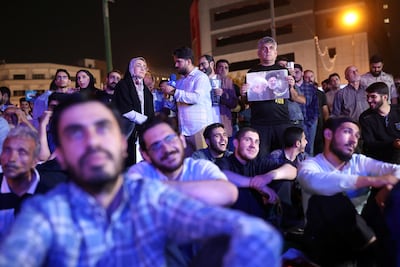Iran’s top two presidential candidates accused each other of having no solution to the country’s problems ahead of Friday's runoff election aimed at choosing a successor for the late president Ebrahim Raisi, who died last month in a helicopter crash.
During a more than two-hour televised debate, reformist candidate Masoud Pezeshkian attacked his competitor, Saeed Jalili, a hard-line former nuclear negotiator, for his lack of experience, saying: “Tell me, what single company have you ever managed to make you capable of running the country?”
Mr Jalili defended himself by highlighting his career and several positions held, including that of a top nuclear negotiator.
Mr Pezeshkian further questioned his opponent on what plans he would have for reaching a nuclear deal, with Mr Jalili responding he would approach it “based on strength not weakness”, without providing details.
Iran will hold a runoff presidential election on Friday, only its second since the 1979 Islamic Revolution, after only 39.9 per cent of its voting public cast a ballot the previous week. Of over 24.5 million votes, more than 1 million ballots were later rejected – typically a sign of people feeling obligated to head to the polls but wanting to reject all the candidates.
Mr Pezeshkian, Iran's sole reformist candidate, said he would focus his foreign policy on building more ties with other countries instead of the aggressions seen by previous governments.

“If we want to grow in the world, the more connections we make, the better we can live,” he said. “The skill of the Ministry of Foreign Affairs or foreign policy should have flexibility and various alternatives for negotiations and trade,” he added.
The ultraconservative Mr Jalili, for his part, said that the discussion of foreign policy is an extension of an internal one.
“You must definitely have a dynamic, active, and successful foreign policy. If we want to gain benefits from those with whom we have most differences, it will certainly not be achieved,” he said.
Mr Pezeshkian also defended former president Hassan Rouhani's foreign policy in signing the nuclear deal known as the Joint Comprehensive Plan of Action (JCPOA) and called for intensified efforts to approve the FATF-related bills by relevant Iranian bodies to expand trade relations with the world. Mr Rouhani endorsed Mr Pezeshkian in this election.
Both sides also promised to address the problems of the country's poor, workers, women, ethnic groups and religious minorities and vowed to provide better and faster internet – a plea to a younger generation that showed apathy during Friday's vote.
Both candidates also said the low turnout in the first round – the lowest-ever poll turnout in the Islamic Republic’s history – should be probed.
“It is not acceptable that some 60 per cent (of voters) did not cast a ballot,” said Mr Pezeshkian.
The US said on Monday it expected no “fundamental change” from Iran no matter who wins the presidential election runoff and said it did not consider the first round free and fair.
The candidates will have their second and final debate later on Tuesday.

